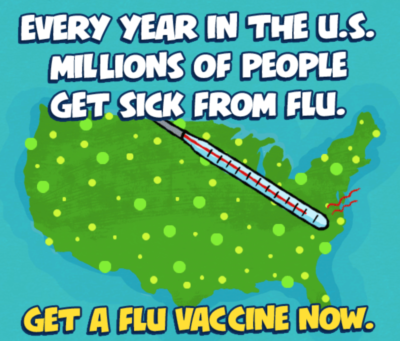- Flu Vaccine Information
- Flu Prevention
When Is the Right Time for Flu Vaccination?

Flu vaccines are starting to become available in parts of the United States and should be widely available shortly. In fact, there will be a record amount of available flu vaccines this year in the U.S. – upwards of 198 million doses according to the Centers for Disease Control and Prevention (CDC). Flu vaccination is more important than ever this season to help prevent an overlap of influenza and COVID-19 activity. If more people are vaccinated against flu, the less likely flu can spread, which will allow our healthcare systems to focus on treating and preventing the novel coronavirus.
When should you get an annual flu vaccine?
The CDC recommends getting vaccinated by the end of October. Because it takes about two weeks following vaccination for your body to produce antibodies, it’s best to get vaccinated before flu starts circulating in your community. It’s especially important for children age six months to 8-years-old who are getting a flu vaccine for the first time to get vaccinated early in the season because they need two doses spaced out by at least 28 days.

Can I get vaccinated too early?
Since we can’t predict when flu will start to circulate, it’s best to get vaccinated before the start of flu season. While flu activity typically peaks in February, it can begin earlier in the fall (e.g., October). While there are concerns that immunity can wane over the course of the flu season if an individual receives a flu vaccine too early, waning immunity is a more common problem in people ages 65 and older. Because this age group is vulnerable to severe flu-related outcomes such as hospitalization and death, it’s especially important for people ages 65 and older to receive an annual flu vaccine. There are flu vaccines specifically designed for older adults, including high-dose and adjuvanted flu vaccines.
Can I get vaccinated too late?
The CDC recommends annual flu vaccination by the end of October, but vaccination even later in the season can still be beneficial so long as it’s done before flu starts circulating in your community. It generally takes two weeks following vaccination to produce antibodies and some protection is always better than none. Even if you have already been sick with influenza, you can still benefit from getting vaccinated during the flu season because flu vaccines protect against multiple circulating strains. And yes, it’s possible to get sick twice in one season from different flu strains, i.e., influenza A (H1N1, H3N2) and influenza B.
Why get vaccinated?
Annual flu vaccination is the best defense against influenza. Every year in the U.S., flu vaccines prevent millions of illnesses and medical visits, hundreds of thousands of hospitalizations, and thousands of deaths. Every year brings a different flu season. We can’t predict it, but we know it’s coming. So think of annual flu vaccination like a seatbelt or insurance – you may not need it, but you’ll be glad you had it just in case. And by getting vaccinated, you help protect yourself, your family, and your community!
Talk to your trusted healthcare professional about which flu vaccine is best for you and an ideal time to get vaccinated. For help finding a flu vaccine near you, visit the Vaccine Finder.

